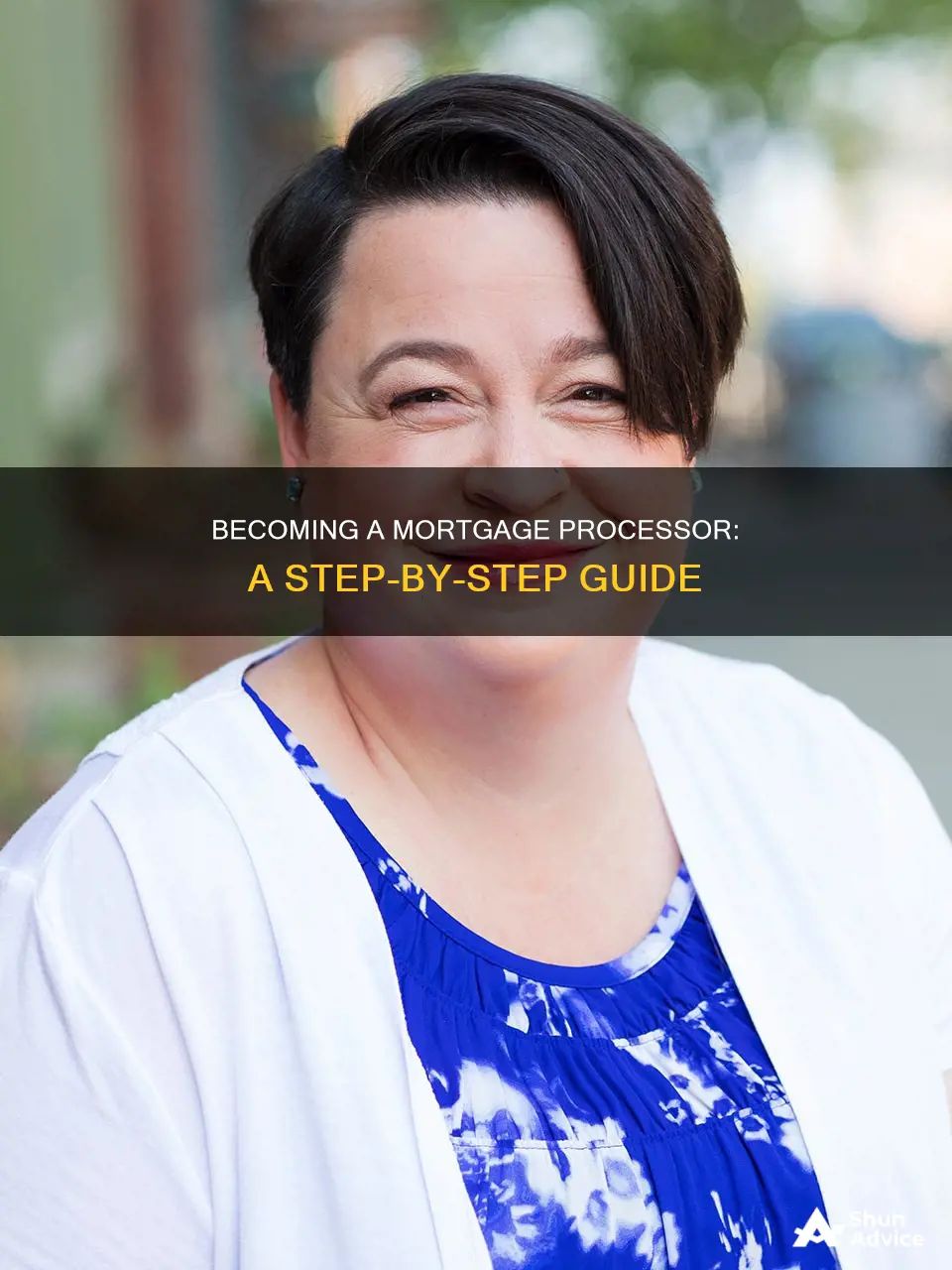
If you're interested in becoming a mortgage processor, you'll need a mix of skills and qualifications to succeed in this role. Mortgage processors play a key role in the mortgage loan process by acting as the middle person between the loan officer and the underwriter. They guide borrowers through the loan application process, collect necessary documents, and ensure that all information is complete and accurate before passing the files through to the underwriter for approval. To become a mortgage processor, a high school diploma is typically the minimum educational requirement, but many employers prefer candidates with a bachelor's degree in a related field such as accounting, finance, or business administration. Additionally, gaining experience through on-the-job training and online financial courses can make you a more appealing candidate. Let's explore the steps to becoming a mortgage processor and the key skills you'll need to excel in this career.
| Characteristics | Values |
|---|---|
| Educational Requirements | A high school diploma or GED is required, but a bachelor's degree in accounting, finance, business administration, or real estate is preferred. |
| Certifications | The National Association of Mortgage Processors (NAMP) offers certification programs with three levels: Certified Mortgage Processor (CMP), Certified Master Loan Processor (CMLP), and Certified Ambassador Loan Processor (CALP). |
| Skills | Attention to detail, excellent data and organizational skills, strong math and communication skills, and knowledge of the mortgage process are essential. |
| Experience | On-the-job training is common, and prior experience in the financial industry or as a loan officer's assistant is advantageous. |
| Licensing | Most states require a license to practice as a mortgage loan processor, which can be obtained through the NAMP. |
What You'll Learn
- Educational requirements: A high school diploma is the minimum requirement, but a bachelor's degree in accounting or finance is preferred
- Certifications: The National Association of Mortgage Processors (NAMP) offers certification programs that cover topics like underwriting principles and loan processor duties
- Skills: Attention to detail, excellent data and organizational skills, and strong math and communication skills are essential for success in this role
- Experience: Gaining experience through on-the-job training or working as a loan officer's assistant can help you get your foot in the door
- Licensing: Most states require a license to practice as a mortgage loan processor, so be sure to research the requirements in your specific state

Educational requirements: A high school diploma is the minimum requirement, but a bachelor's degree in accounting or finance is preferred
To become a mortgage processor, you'll need at least a high school diploma or GED. This is the minimum educational requirement for most loan companies. However, many employers prefer candidates with a bachelor's degree in accounting or finance. An associate's or bachelor's degree in a related field, such as business administration or real estate, is also often considered.
Having a degree is not mandatory, but it can make your application more competitive and provide you with valuable knowledge and skills relevant to the role. Additionally, some prior work experience in the finance or banking industry is often preferred by employers.
You can also pursue loan processing certifications to enhance your qualifications and demonstrate your competence and ethics in the field. The National Association of Mortgage Processors (NAMP) offers certification programs with three levels of progression: Certified Mortgage Processor (CMP), Certified Master Loan Processor (CMLP), and Certified Ambassador Loan Processor (CALP). These certifications can provide a comprehensive understanding of the role and valuable real-world experience.
While not always necessary, obtaining a license to practice as a mortgage loan processor is required in most states. Therefore, it is essential to research the specific requirements of your state or country to ensure you have the correct licenses and certifications.
Assuming Deceased Husband's Mortgage: Florida's Legal Process
You may want to see also

Certifications: The National Association of Mortgage Processors (NAMP) offers certification programs that cover topics like underwriting principles and loan processor duties
The National Association of Mortgage Processors (NAMP) offers certification programs that can help you understand the role of a loan processor and gain invaluable real-world experience. The certification process is through the National Association of Mortgage Processors, and they offer three levels of certification.
The first level of certification is a Certified Mortgage Processor (CMP). To earn a CMP, the loan processor must complete at least six hours of basic loan processing training and six hours of advanced loan processing training. Candidates must pass the CMP exam with a minimum score of 85% and are subject to a background check.
The next level of certification is the Certified Master Loan Processor (CMLP). This certification is designed to help mortgage professionals advance their careers in mortgage loan processing. It covers topics such as underwriting principles, loan processor duties, and best practices. The NAMP thought-leader loan processing certification programs help identify mortgage professionals who have met the high standards of competency and ethics established by the NAMP Code of Ethics.
The highest level of certification is the Certified Ambassador Loan Processor (CALP). To earn this certification, the loan processor completes a minimum of 42 hours of training, including all four subjects of the CMLP exam, the FHA's special rehab program, analysis of tax returns, and mortgage fraud awareness and prevention. The minimum passing grade for a CALP certification is 85%, and candidates are subject to a background check.
NAMP certification is valued by many recruiters and hiring managers as it validates a candidate's knowledge of mortgage guidelines and regulations. It also demonstrates that the candidate has acquired the necessary mortgage loan processing skills to transition smoothly into the mortgage profession.
Applying for Mortgage Assistance: A Step-by-Step Guide
You may want to see also

Skills: Attention to detail, excellent data and organizational skills, and strong math and communication skills are essential for success in this role
To be a successful mortgage processor, you need to possess a diverse skill set that works well in the financial industry. Here are some essential skills to focus on:
Attention to Detail
Mortgage processors deal with a lot of documentation and information. Attention to detail is crucial to ensure that all the required documents are present and contain accurate information. This includes tax returns, W-2s, gross monthly income, proof of insurance, bank statements, and evidence of assets and debts. Paying close attention to detail also helps in reviewing credit reports for any inaccuracies, late payments, or collections.
Excellent Data and Organizational Skills
Mortgage processors must possess strong data skills to efficiently manage and organize the financial information and documents collected from borrowers. They need to be adept at data entry and have a systematic approach to organizing and preparing information for the underwriter's review and approval. This skill ensures that the loan application process is streamlined and efficient.
Strong Math and Communication Skills
A solid understanding of math is essential for mortgage processors. They need to be comfortable with numbers and financial calculations to guide borrowers through the loan application process effectively. Additionally, strong communication skills are vital as mortgage processors act as intermediaries between the loan officer and the underwriter. Clear and concise communication ensures that all parties involved have a clear understanding of the loan process and requirements.
Developing these skills and gaining relevant experience through on-the-job training, online courses, or certification programs can help set you up for success in the role of a mortgage processor.
Becoming a Mortgage Advisor: UK Pathways and Qualifications
You may want to see also

Experience: Gaining experience through on-the-job training or working as a loan officer's assistant can help you get your foot in the door
Gaining experience through on-the-job training or working as a loan officer assistant can help you get your foot in the door as a mortgage processor. Most of a loan processor's training is on the job, and you can simultaneously work in this position while attending classes for a bachelor's degree. You can gain real-world experience in this position and it can help you work towards other areas of mortgage loan processing if you follow this career path.
You can also gain experience by completing a loan processing certification program. The National Association of Mortgage Processors (NAMP) offers a variety of cost-effective residential and commercial mortgage processing certification programs for aspiring loan processors nationwide. These programs cover topics like underwriting principles, the approval process, loan processor duties, credit counselling, fraud detection, and basic appraisal principles.
Another way to gain experience is to work in a bank. Many banks and companies provide on-the-job training, which can be a great way to get your foot in the door in the industry.
Additionally, having a background in customer service can also be beneficial when applying for loan processor roles. This can include any work where you interacted with customers and helped them pick the right products for their needs, such as a retail job.
Adding a Co-Borrower to Your Connecticut Mortgage: What You Need to Know
You may want to see also

Licensing: Most states require a license to practice as a mortgage loan processor, so be sure to research the requirements in your specific state
Licensing requirements for mortgage loan processors vary across the United States. Most states require a license to practice as a mortgage loan processor, but the type of license and the requirements to obtain it differ.
Some states, such as Alabama, Arizona, Arkansas, California, Colorado, Florida, Georgia, Illinois, Iowa, Kansas, Maryland, Minnesota, Mississippi, Montana, Nebraska, New Hampshire, New Jersey, Oklahoma, Oregon, South Carolina, Tennessee, Texas, Washington, and West Virginia, have specific mortgage broker or lender licensing requirements.
Other states may have Exempt Company Registration options, which still require licensing an MLO (Mortgage Loan Originator) and completing education and testing. Additionally, some states may require a surety bond from an insurance company, which can cost between $200 and $1,000 per state.
It is important to note that even within states, the licensing requirements can vary depending on the specific role and duties of the mortgage loan processor. For example, a processor who performs only clerical or support duties under the supervision of a licensed loan originator may be exempt from certain licensing requirements.
To ensure you meet the necessary licensing requirements, it is essential to research the specific regulations in your state and understand the duties and responsibilities associated with the mortgage loan processor role you are pursuing.
Becoming a Mortgage Officer: Texas Requirements and Steps
You may want to see also
Frequently asked questions
A mortgage processor guides borrowers through the loan application process by collecting documents and information. They act as a middle person between a loan officer and an underwriter. They also double-check that the borrower has sufficient cash to close the mortgage transaction.
A high school diploma or GED is required, but many employers prefer a bachelor's degree in accounting, finance, or a related field. Some employers consider an associate's degree. There are also loan processing certificate programs available that cover topics like underwriting principles, the approval process, and loan processor duties.
Most states do not require loan processors to be licensed, but it's important to check your state's requirements as some do. You can also earn a license through the National Association of Mortgage Processors (NAMP), which provides training to aspiring loan processors.
An essential skill for a mortgage processor is attention to detail. Your role includes gathering information about the client and organizing it for the underwriter, so it's important to ensure the correct documents are present and that information is accurate.







